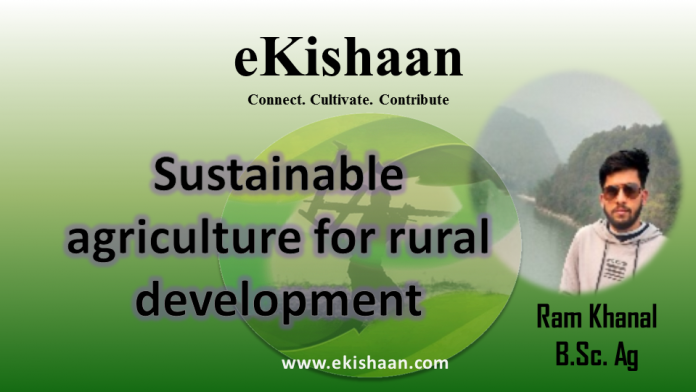Sustainable agriculture for rural development
Sustainable agriculture is an effective poverty reduction strategy when matched with rural development strategies to address the economic, social and political disadvantages of the poor. It can increase income and food supply at household level and can provide cheaper food, increased employment opportunities and higher wages which contribute to broader poverty reduction.
About 22,843,197 Nepalese live in rural areas of the country which accounts for 79.85% of the Nepal population (World Bank, 2019). In the rural communities, small businesses (including farms) are the important part of both the economy and social structure. Most rural areas are dependent on agriculture as a large part of their local economy and development. Agriculture with livestock is the major sources of livelihood for the majority of Nepalese people in rural areas. However, agriculture in Nepal is subsistence in nature and is unsustainable.
Sustainable development of agriculture and livestock is the key for rural economy and its development since other sources of employment and income opportunities are not available in the rural areas. Growth rate of agriculture is only 2.8% which indicates a low rate. Agriculture growth is considered to be effective in reducing poverty than in industrial growth. At present, people seem to be less interest in agriculture sector because it is less attractive in term of getting cash and it resulted in migration flow from rural to urban.
Rural poverty is the main hindrance of rural development. Majority of the poor live in rural areas and suffer from high rates of hunger, malnutrition, diseases, illiteracy and mortality. These conditions reinforce poverty. Most of the household members of the rural area have been in abroad for foreign employment and remittance have become the major source of national economy. CBS data reveals that more than 2 million Nepalese people are in overseas employment. Out of 100 overseas migrants 81% are from rural areas. After returning home only a few of them have been engaged in agriculture. Youths are the backbone for the development of nation. But outmigration of youths from the country for their livelihood has become a serious problem and it hinders the development process. It seems that national policies cannot attract new generation towards agriculture that is why agriculture sector is lagging behind day by day. Nepal had exported paddy before 1975 but it is importing food grains beginning in 1980 (Mishra,1987). Despite a large contribution of agriculture sector in national GDP, agricultural growth rate seems to be fluctuating. Since growth rate is lower with respect to population increment, the amount produced from agriculture is not satisfactory. Many western hill districts of the country have been facing food deficit every year. To cope with this poor rural mostly used to go to India in search of work in off-farming season. This is a result of unsustainable agriculture. The agriculture sector in Nepal has been facing a number of problems ranging from policy to implementation level and inputs availability and support services such as subsidy, insurance etc. The coordination between farmers and whole seller/industrial seem not to be good enough and decision related to agriculture particularly cost is not fixed timely by concerned authority and farmers could not benefits lavishly. Agriculture market is in the hand of few middleman that’s why the farmers are not getting the fair price of their products. Inappropriate agricultural practices, excessive use of external inputs, conversion of agricultural land to non-agricultural uses causes natural resources degradation and decline in agricultural productivity. Rural people often know how to conserve their environment, but they may need to over-exploit resources in order to survive. So sustainable agriculture is only the way to control natural resources degradation and reduce poverty leading towards rural development.
Agricultural growth has an impact on poverty because increased agricultural productivity can increase household income and improve food security and resilience. When agricultural productivity increases, poor consumers benefit from lower food prices. This creates significant savings as the poor spend a large share of their income on food. The higher income and saving generated by agricultural growth create increased demands for non-farm goods and services. This in turn, provides employment opportunities for landless and waged industrial workers. Sustainable agriculture contribute on agro-ecotourism, resources management, production increasement, establishment of agrobased industries and infrastructures development which are the foundations for rural development. Sustainable agriculture and rural development are sustainable when they are ecologically sound, economically viable, socially just, culturally appropriate, humane and based on scientific approach. Rural development policy must aim to meet the nutritional and other human needs of present and future generations; and maintain and if possible, enhance the productive and regenerative capacity of the natural resources. This aim can be achieved only through sustainable agriculture practices.
Agriculture friendly economic policy and effective implementation are required for agriculture development. Sustainability must be the centered idea in the context of agriculture development. Sustainable economic growth can be achieved through sustainable agriculture development. Government should make local bodies effective in delivery services of agriculture related matters to local level. The support policies and programs such as incentives, opportunities, easy access to needed inputs and compensation in case of loss of production due to disease and natural calamities and insurance policy, credit facilities should be initiated. The new generation can be encouraged through the insurance and subsidy in the agriculture sector. Provision of properly managed market facilities and access of farmers to the modern technologies must be ensured. Provide extension and education programmes and build the capacity of the poor to promote the adoption of sustainable agricultural production practices that protect and conserve the environment. These all issues and problems related to agriculture development are important in the wake of agriculture development. Only if the government of Nepal addresses these issues and problems, rural development can be accelerated by reducing poverty and rural development is possible in true sense.
